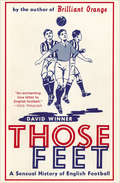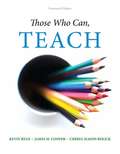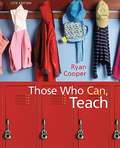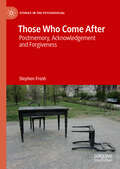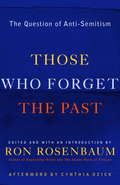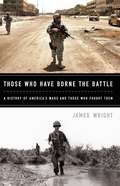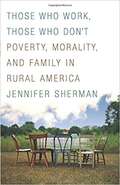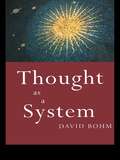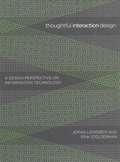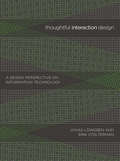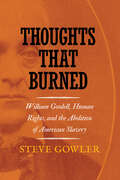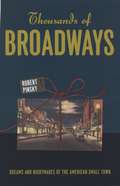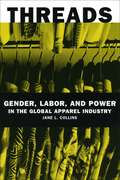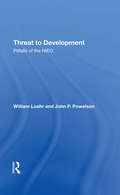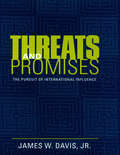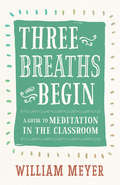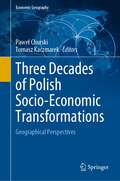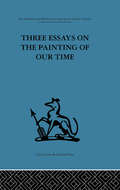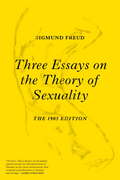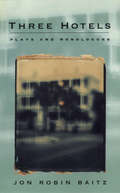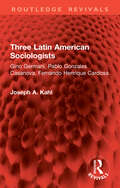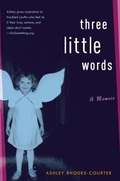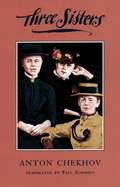- Table View
- List View
Those Feet: A Sensual History of English Football
by David WinnerThis follow-up to Brilliant Orange: The Neurotic Genius of Dutch Soccer is &“an enchanting love letter to English football&” (The Daily Telegraph). In this playful, witty, and highly original look at English soccer, David Winner, author of the acclaimed Brilliant Orange, journeys to the heart of an essential English pastime and sheds new light on the true nature of a rapidly changing game that was never really meant to be beautiful. With the same insightful eye he brought to his bestselling study of Dutch soccer, Winner shows how Victorian sexual anxiety underlies England&’s many World Cup failures. He reveals the connection between Roy Keane and a soldier who never lived but died in the &“Charge of the Light Brigade.&” And he demonstrates how thick mud and wet leather shaped the contours of the English soul. &“It&’s neither a history of the game nor a memoir, instead exploring the interplay between sport, history, and national character . . . For thinking fans of the game, this is exquisitely pleasurable reading . . . As [Winner] finds acceptance, and even fondness, for the English game, his insight, humor, warmth, and enthusiasm place him in the top echelon of soccer writers.&” —Booklist (starred review) &“Thank God for David Winner . . . With an easy wit, Winner traces the game back to its roots and the results are as intriguing as they are amusing . . . A marvelous book.&” —Duncan White, FourFourTwo
Those Who Can Teach (Fourteenth Edition)
by Kevin Ryan James M. Cooper Cheryl Mason BolickThis book's state-of-the-art and reader-friendly approach will help you make an informed decision about becoming a teacher while inspiring and welcoming them to a rewarding, high-impact career. Using multiple sources, including biographies, narratives, profiles, and interviews with top educators and scholars, the text shows you the realities of teaching.
Those Who Can, Teach (Twelfth Edition)
by Kevin Ryan James M. CooperTHOSE WHO CAN, TEACH, 12/E, is a current, dynamic, and reader-friendly approach to help students make informed decisions about entering the teaching profession.
Those Who Come After: Postmemory, Acknowledgement and Forgiveness (Studies in the Psychosocial)
by Stephen FroshThis book explores the legacies of suffering in relation to ‘those who come after’ – the descendants of victims, survivors and perpetrators of traumatic events. It draws on recent discussions of ‘postmemory’ and ‘haunting’ that are concerned mainly with the transgenerational impact of personal and social trauma. It examines how we are connected to past events for which we have no direct responsibility yet in which we might in some way be ‘implicated’ and it asks how we might attain a position of active witnessing that helps resolve the suffering of others. Those Who Come After includes vivid accounts of witnessing from a variety of perspectives, ranging from Biblical and Jewish stories to contemporary art and music. The book draws on psychosocial studies and psychoanalysis to help make sense of this material and to develop an understanding of acknowledgment and responsibility that is both ethical and emancipatory. Those Who Come After will be of great interest to readers in psychosocial studies and psychoanalysis and to all who are concerned with the question of how to put past suffering to rest.
Those Who Forget the Past: The Question of Anti-Semitism
by Ron RosenbaumSomething has changed. After the horrors of World War II, people everywhere believed that it could never happen again, but today the evidence is unmistakable that anti-Semitism is dramatically on the rise once more. The torching of European synagogues, suicide terror in Israel, the relentless comparison of the Israelis to Nazis, the paranoid post-September 11 Internet-bred conspiracy theories, the Holocaust-denial literature spreading throughout the Arab world, the calumny and violence erupting on American college campuses: Suddenly, a new anti-Semitism has become widespread, even acceptable to some. In this chilling and important new book, Ron Rosenbaum, author of the highly praised Explaining Hitler, brings together a collection of powerful essays about the origin and nature of the new anti-Semitism. Paul Berman, Marie Brenner, David Brooks, Harold Evans, Todd Gitlin, Jeffrey Goldberg, Bernard Lewis, David Mamet, Amos Oz, Cynthia Ozick, Frank Rich, Jonathan Rosen, Edward Said, Judith Shulevitz, Lawrence Summers, Jeffrey Toobin, and Robert Wistrich are among the distinguished writers and intellectuals who grapple with painful questions: Why now? What is--or isn't--new? Is a second Holocaust possible, this time in the Middle East? How does anti-Semitism differ from anti-Zionism? These are issues too dangerous to ignore, too pressing to deny. Those Who Forget the Past is an essential volume for understanding the new bigotry of the twenty-first century. From the Trade Paperback edition.
Those Who Have Borne the Battle: A History of America's Wars and Those Who Fought Them
by James WrightAt the heart of the story of AmericaOCOs wars are our OC citizen soldiersOCOOCothose hometown heroes who fought and sacrificed from Bunker Hill at Charlestown to Pointe du Hoc in Normandy, and beyond, without expectation of recognition or recompense. Americans like to think that the service of its citizen volunteers is, and always has been, of momentous importance in our politics and society. But though this has made for good storytelling, the reality of AmericaOCOs relationship to its veterans is far more complex. In "Those Who Have Borne the Battle, "historian and marine veteran James Wright tells the story of the long, often troubled relationship between America and those who have defended herOCofrom the Revolutionary War to todayOCoshedding new light both on our history and on the issues our country and its armed forces face today. aFrom the beginning, American gratitude to its warriors was not a given. Prior to World War II, the prevailing view was that, as citizen soldiers, the service of its young men was the price of citizenship in a free society. Even Revolutionary War veterans were affectionately, but only temporarily, embraced, as the new nation and its citizens had much else to do. aIn time, the celebration of the nationOCOs heroes became an important part of our culture, building to the response to World War II, where warriors were celebrated and new government programs provided support for veterans. aThe greater transformation came in the wars after World War II, as the way we mobilize for war, fight our wars, and honor those who serve has changed in drastic and troubling ways. Unclear and changing military objectives have made our actions harder for civilians to stand behind, a situation compounded by the fact that the armed forces have become less representative of American society as a whole. Few citizens join in the sacrifice that war demands. The support systems seem less and less capable of handling the increasing number of wounded warriors returning from our numerous and bewildering conflicts abroad. aaaaaaaaaaa A masterful work of history, "Those Who Have Borne the Battle" expertly relates the burdens carried by veterans dating back to the Revolution, as well as those fighting todayOCOs wars. And it challenges Americans to do better for those who serve and sacrifice today.
Those Who Work, Those Who Don't: Poverty, Morality, and Family in Rural America
by Jennifer ShermanWhen the rural poor prioritize issues such as the right to bear arms, and disapprove of welfare despite their economic concerns, they are often dismissed as uneducated and backward by academics and political analysts. In Those Who Work, Those Who Don't, Jennifer Sherman offers a much-needed sympathetic understanding of poor rural Americans, persuasively arguing that the growing cultural significance of moral values is a reasonable and inevitable response to economic collapse and political powerlessness. Those Who Work, Those Who Don't is based on the intimate interviews and in-depth research Sherman conducted while spending a year living in "Golden Valley," a remote logging town in Northern California. Economically devastated by the 1990 ruling that listed the northern spotted owl as a threatened species, Golden Valley proved to be a rich case study for Sherman. She looks at how the members of the community coped with downward mobility caused by the loss of timber industry jobs and examines a wide range of reactions. She shows how substance abuse, domestic violence, and gender roles fluctuated under the town's economic strain. <p><p> Compellingly written, shot through with honesty and empathy, Those Who Work, Those Who Don't is a rare firsthand account that studies the rural poor. As incomes erode and the American dream becomes more and more inaccessible, Sherman reveals that moral values and practices become a way for the poor to gain status and maintain a sense of dignity in the face of economic ruin.
Those Who Work, Those Who Don't: Poverty, Morality, and Family in Rural America
by Jennifer ShermanWhen the rural poor prioritize issues such as the right to bear arms, and disapprove of welfare despite their economic concerns, they are often dismissed as uneducated and backward by academics and political analysts. In Those Who Work, Those Who Don't, Jennifer Sherman offers a much-needed sympathetic understanding of poor rural Americans, persuasively arguing that the growing cultural significance of moral values is a reasonable and inevitable response to economic collapse and political powerlessness.Those Who Work, Those Who Don't is based on the intimate interviews and in-depth research Sherman conducted while spending a year living in "Golden Valley," a remote logging town in Northern California. Economically devastated by the 1990 ruling that listed the northern spotted owl as a threatened species, Golden Valley proved to be a rich case study for Sherman. She looks at how the members of the community coped with downward mobility caused by the loss of timber industry jobs and examines a wide range of reactions. She shows how substance abuse, domestic violence, and gender roles fluctuated under the town's economic strain.Compellingly written, shot through with honesty and empathy, Those Who Work, Those Who Don't is a rare firsthand account that studies the rural poor. As incomes erode and the American dream becomes more and more inaccessible, Sherman reveals that moral values and practices become a way for the poor to gain status and maintain a sense of dignity in the face of economic ruin.
Thought as a System (Key Ideas)
by David BohmFirst Published in 1994. Routledge is an imprint of Taylor & Francis, an informa company.
Thoughtful Interaction Design: A Design Perspective on Information Technology
by Jonas Löwgren Erik StoltermanThe authors of Thoughtful Interaction Design go beyond the usual technical concerns of usability and usefulness to consider interaction design from a design perspective. The shaping of digital artifacts is a design process that influences the form and functions of workplaces, schools, communication, and culture; the successful interaction designer must use both ethical and aesthetic judgment to create designs that are appropriate to a given environment. This book is not a how-to manual, but a collection of tools for thought about interaction design. Working with information technology--called by the authors "the material without qualities"--interaction designers create not a static object but a dynamic pattern of interactivity. The design vision is closely linked to context and not simply focused on the technology. The authors' action-oriented and context-dependent design theory, drawing on design theorist Donald Schon's concept of the reflective practitioner, helps designers deal with complex design challenges created by new technology and new knowledge. Their approach, based on a foundation of thoughtfulness that acknowledges the designer's responsibility not only for the functional qualities of the design product but for the ethical and aesthetic qualities as well, fills the need for a theory of interaction design that can increase and nurture design knowledge. From this perspective they address the fundamental question of what kind of knowledge an aspiring designer needs, discussing the process of design, the designer, design methods and techniques, the design product and its qualities, and conditions for interaction design.
Thoughtful Interaction Design: A Design Perspective on Information Technology (The\mit Press Ser.)
by Erik Stolterman Jonas LowgrenThe authors of Thoughtful Interaction Design go beyond the usual technical concerns of usability and usefulness to consider interaction design from a design perspective. The shaping of digital artifacts is a design process that influences the form and functions of workplaces, schools, communication, and culture; the successful interaction designer must use both ethical and aesthetic judgment to create designs that are appropriate to a given environment. This book is not a how-to manual, but a collection of tools for thought about interaction design.Working with information technology—called by the authors "the material without qualities"—interaction designers create not a static object but a dynamic pattern of interactivity. The design vision is closely linked to context and not simply focused on the technology. The authors' action-oriented and context-dependent design theory, drawing on design theorist Donald Schön's concept of the reflective practitioner, helps designers deal with complex design challenges created by new technology and new knowledge. Their approach, based on a foundation of thoughtfulness that acknowledges the designer's responsibility not only for the functional qualities of the design product but for the ethical and aesthetic qualities as well, fills the need for a theory of interaction design that can increase and nurture design knowledge. From this perspective they address the fundamental question of what kind of knowledge an aspiring designer needs, discussing the process of design, the designer, design methods and techniques, the design product and its qualities, and conditions for interaction design.
Thoughts That Burned: William Goodell, Human Rights, and the Abolition of American Slavery
by Steve GowlerIn Thoughts That Burned, Steve Gowler showcases the life of William Goodell, one of the most significant leaders of the antebellum antislavery movement. Between 1826 and 1864, Goodell edited more than a dozen reform newspapers and played a leading role in the formation of several organizations, including the American Anti-slavery Society, the Liberty Party, the American Missionary Association, and the Radical Abolition Party. His 1852 book Slavery and Anti-slavery was the first comprehensive history of the antislavery movement written by an American.Convinced that the logic of slavery needed to be investigated and laid bare, Goodell explored the institution's deep structures. Whereas many abolitionists based their arguments on the inhumane consequences of enslavement, Goodell analyzed the legal and psychological relations constituting the slave system. At the heart of this analysis was his close reading of Southern slave codes and of the United States Constitution. He argued that the Constitution, properly understood, is incompatible with slavery and should be used as an instrument of emancipation. Among those influenced by his constitutional hermeneutic was Frederick Douglass, who described Goodell as the man "to whom the cause of liberty in America is as much indebted as to any other one American citizen." Thoughts That Burned is the first comprehensive biography of this extraordinary thinker, whose powerful political and theological arguments grounded abolition within the concept of human rights.
Thousands of Broadways: Dreams and Nightmares of the American Small Town
by Robert PinskyBroadway, the main street that runs through Robert Pinsky's home town of Long Branch, New Jersey, was once like thousands of other main streets in small towns across the country. But for Pinsky, one of America's most admired poets and its former Poet Laureate, this Broadway is the point of departure for a lively journey through the small towns of the American imagination. The citizens of quintessential small towns know one another extensively and even intimately, but fail to recognize the geniuses and criminal minds in their midst. Bringing the works of such figures as Mark Twain, William Faulkner, Alfred Hitchcock, Thornton Wilder, Willa Cather, and Preston Sturges to bear on this paradox, as well as reflections on his own time growing up in a small town, Pinsky explores how such imperfect knowledge shields communities from the anonymity and alienation of modern life. Along the way, he also considers how small towns can be small-minded -- in some cases viciously judgmental and oppressively provincial. Ultimately, Pinsky examines the uneasy regard that creative talents like him often have toward the small towns that either nurtured or thwarted their artistic impulses.
Threads: Gender, Labor, and Power in the Global Apparel Industry
by Jane L. CollinsAmericans have been shocked by media reports of the dismal working conditions in factories that make clothing for U. S. companies. But while well intentioned, many of these reports about child labor and sweatshop practices rely on stereotypes of how Third World factories operate, ignoring the complex economic dynamics driving the global apparel industry. To dispel these misunderstandings, Jane L. Collins visited two very different apparel firms and their factories in the United States and Mexico. Moving from corporate headquarters to factory floors, her study traces the diverse ties that link First and Third World workers and managers, producers and consumers. Collins examines how the transnational economics of the apparel industry allow firms to relocate or subcontract their work anywhere in the world, making it much harder for garment workers in the United States or any other country to demand fair pay and humane working conditions. Putting a human face on globalization, Threads shows not only how international trade affects local communities but also how workers can organize in this new environment to more effectively demand better treatment from their distant corporate employers.
Threat To Development: Pitfalls Of The Nieo
by William Loehr John P PowelsonFar from transferring resources from the rich to the poor, as intended, the New International Economic Order (NIEO)—if fully implemented—is more likely to transfer them from the poor to the rich. Thus assert the authors, who present their analysis of trade and investment data in support of their conclusions. The NIEO, a program adopted by the United Nations, proposes increased prices of primary products, tariff preferences for exports of less developed countries to the industrial world, a code of conduct for multinational corporations, international monetary reform, debt forgiveness or rescheduling for the third world, plus a number of other provisions designed to help third world countries. But, the authors contend, all these provisions will further enrich the already rich within the third world, while adding to the poverty of the already poor. Higher prices for primary products would benefit the rich producers at the expense of the poor who buy them. Debt rescheduling would help only those rich enough to incur debt in the first place; because aid is available in finite quantities, this help might be at the expense of the poor. Likewise, trade preferences would also help the rich, who are the major exporters. The NIEO has been widely acclaimed in industrialized as well as in third world countries; this book demonstrates how the effects of the NIEO could well be the opposite from what is widely believed.
Threats and Promises: The Pursuit of International Influence
by James W. DavisConventional wisdom dictates that the conditions of international politics require states to pursue "tough" strategies based on threats, ruling out "soft" strategies such as reassurances or appeasement. In Threats and Promises, James W. Davis, Jr., works toward a theory of influence in international politics that recognizes the power of promises and assurances as tools of statecraft. Davis offers an analytic treatment of promises and assurances, drawing on relevant strands of international relations theory and deterrence theory, as well as cognitive and social psychology. Building on prospect theory (from cognitive psychology), he develops a testable theory of influence that suggests promises are most effective when potential aggressors are motivated by a desire to avoid loss. Davis then considers a series of case studies drawn principally from German diplomatic relations in the later nineteenth and early twentieth century. From the case studies—which focus on such issues as European stability, colonial competition, and the outbreak of the First World War—Davis shows how a blending of threats and promises according to reasoned principles can lead to a new system of more creative statecraft.While many critical analyses exist on the use of threats, there are relatively few on the use of promises. Davis argues that promises have been central to outcomes that were previously attributed to the successful use of deterrent threats, as well as the resolution of many crises where threats failed to deter aggression. Threats and Promises challenges the conventional wisdom and is an original contribution to the field of international politics.
Three Breaths and Begin: A Guide to Meditation in the Classroom
by William MeyerLEARN THE TRANSFORMATIVE POWER OF MEDITATION IN THE CLASSROOM Meditation can be a potent practice for creating focus and facilitating learning in the classroom, for kindergarteners, grad students, and everyone in between. Longtime schoolteacher William Meyer has taught a variety of meditation techniques to students, fellow teachers, and parents with remarkable results. In Three Breaths and Begin, Meyer details how teachers can incorporate mindfulness into their curricula every day. He covers every aspect of teaching meditation, from creating a dedicated space in the classroom to meditating on field trips, in sports settings, and even in the midst of tragedy. Offering numerous ready-to-use scripted meditations, this insightful, practical, and loving guide will benefit anyone interested in the well-being of students — and, most of all, the students themselves.
Three Decades of Polish Socio-Economic Transformations: Geographical Perspectives (Economic Geography)
by Paweł Churski Tomasz KaczmarekThis edited volume analyses and discusses the systematisation of Polish socio-economic transformations of the last three decades using selected examples of the most important changes. 1989 marked the onset of the political transformation process in Poland and other countries of Central and Eastern Europe. The transition involved a shift from a socialist system to a parliamentary democracy and from a command economy to a market one. Due to the deep economic crisis that culminated in 1988 and the peaceful model of change developed and implemented in Poland, the magnitude and manner of implementing various initiatives was unprecedented and had specific implications. This transformation opened Polish society and the Polish economy to the impact of global social and economic changes, triggering successive transformations, often overlapping in terms of their causes and consequences. This publication aims to present the course and effects, in particular territorial, of Poland's socio-economic transformation in the years 1990–2020. The analysis covers the key aspects of this transformation, illustrated with references to the concepts and theories of development, domestic and foreign literature, own empirical research and existing or newly developed model approaches to transformation in the territorial dimension. The book appeals to researchers and student in the fields of geography, spatial management, economics and business, sociology and political sciences, public and private economic research institutes, employees of governmental bodies and corporations, consultants in public administration, journalists and policymakers.
Three Essays on the Painting of our Time
by Adrian StokesTavistock Press was established as a co-operative venture between the Tavistock Institute and Routledge & Kegan Paul (RKP) in the 1950s to produce a series of major contributions across the social sciences. This volume is part of a 2001 reissue of a selection of those important works which have since gone out of print, or are difficult to locate. Published by Routledge, 112 volumes in total are being brought together under the name The International Behavioural and Social Sciences Library: Classics from the Tavistock Press. Reproduced here in facsimile, this volume was originally published in 1961 and is available individually. The collection is also available in a number of themed mini-sets of between 5 and 13 volumes, or as a complete collection.
Three Essays on the Theory of Sexuality: The 1905 Edition
by Sigmund Freud Herman Westerink Phillippe Van Haute Ulrike KistnerThe first edition of this classic work from 1905 shows a radically different psychoanalysisThe traditional story about the historical origins of Freudian psychoanalysis implies that the Oedipus complex was part of Freudian theory from the very beginning. However, in this first edition of Three Essays on Sexuality, first published in 1905 and never before translated into English, we find no reference whatsoever to the Oedipus complex. Is there a Freudian psychoanalysis that is not Oedipal?This first version of Freud’s Three Essays articulates just such a non-Oedipal psychoanalysis. As such, it still has a definite ‘emancipatory’ potential; Freudian psychoanalysis is not Oedipal in its very nature. It is only from 1909 onwards that psychoanalysis tends to become a sophisticated defence of what Freud first called the ‘popular opinion’ about sexuality. It was precisely this ‘popular opinion’ that psychoanalysis originally was meant to deconstruct. Is there a Freudian escape – that is an escape that remains not so much within Freudian orthodoxy, but at least within its inspiration – from this impasse?If Freud has respected more systematically his own original thesis, could it be that the Oedipus complex wouldn’t be the shibboleth of psychoanalysis? Not only is this first edition less Oedipal than is generally believed, but it also contains the elements for thinking a ‘non-Oedipal’ psychoanalysis; a Freud against Oedipus.Introduction by Philippe Van HauteFrom the Trade Paperback edition.
Three Hotels: Plays and Monologues
by Jon Robin BaitzDazzling audiences with the linguistic artistry, keen insights and comprehensive vision of Three Hotels, Jon Robin Baitz enhances his reputation as one of America's most important playwrights. <P><P> In three dramatic monologues that progress from intellectual cynicism to heartbreaking honesty, he reveals the emotional and physical wounds sustained by the foot soldiers of the conglomerates operating in Third World countries and, by extension, by all Americans adrift in the seas of international commerce and politics.Also included are several shorter works (Four Monologues, Coq au Vin, It Changes Every Year and Recipe for One, or A Handbook for Travelers), each of which, like Three Hotels, "is the fervent prayer that there will be something in this wrecked world to salvage." Jon Robin Baitz is the author of The Film Society, Other Desert Cities, The End of the Day, and The Substance of Fire, which he adapted into a major motion picture. He was the showrunner on ABC's Brothers & Sisters. He also wrote the screenplay for the upcoming film Stonewall directed by Roland Emmerich. He lives in New York.
Three Hundred & Sixty Six Menus
by BrisseFirst published in 2005. Routledge is an imprint of Taylor & Francis, an informa company.
Three Latin American Sociologists: Gino Germani, Pablo Gonzales Casanova, Fernando Henrique Cardosa (Routledge Revivals)
by Joseph A. KahlOriginally published in 1976 under the title Modernization, Exploitation and Dependency in Latin America, and again in 1988 under the current title, the author describes, examines and introduces the life and work of three of the most important figures in the development of comparative politics and political sociology: Gino Germani (Argentina), Pablo Gonzales Casanova (Mexico) and Fernando Henrique Cardoso (Brazil). At the time of its first publication, the book introduced those three Latin American sociologists to the North American social and political science community. However, as Peter Evans points out in his introduction, the book had not lost its importance in the intervening years. Rather, the subsequent developments in comparative scholarship have only highlighted the influence of the three Latin Americans. The developments in comparative and political social science can virtually only be understood in the light of the influence that the thought of Germani, Gonzales Casanova and Cardoso had on the discussions in North America.
Three Little Words: A Memoir
by Ashley Rhodes-Courter"Sunshine, you're my baby and I your only mother. You must mind the one taking care of you, but she's not your mama. " Ashley Rhodes-Courter spent nine years of her life in fourteen different foster homes, living by those words. As her mother spirals out of control, Ashley is left clinging to an unpredictable, dissolving relationship, all the while getting pulled deeper and deeper into the foster care system. Painful memories of being taken away from her home quickly become consumed by real-life horrors, where Ashley is juggled between caseworkers, shuffled from school to school, and forced to endure manipulative, humiliating treatment from a very abusive foster family. In this inspiring, unforgettable memoir, Ashley finds the courage to succeed-and in doing so, discovers the power of her own voice. It only takes three little words to break free from the past.
Three Sisters
by Anton Chekhov Paul SchmidtThis refreshingly clear and colloquial adaptation was the basis for the Wooster Group's acclaimed production Brace Up!
